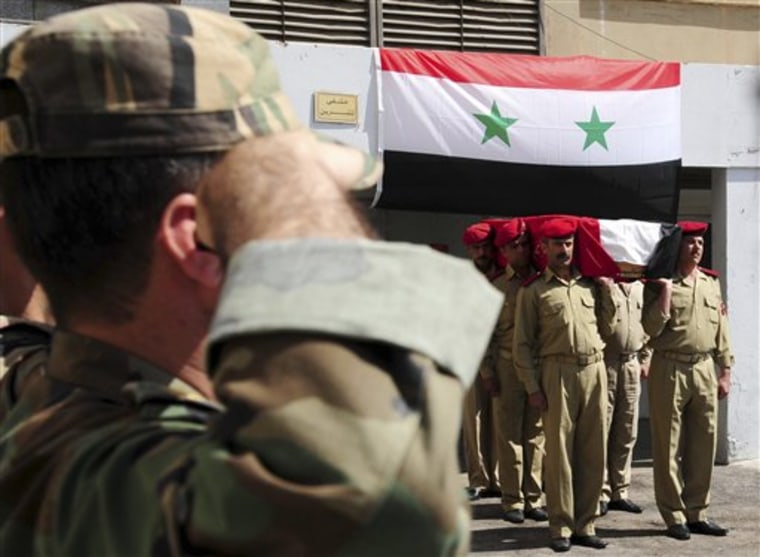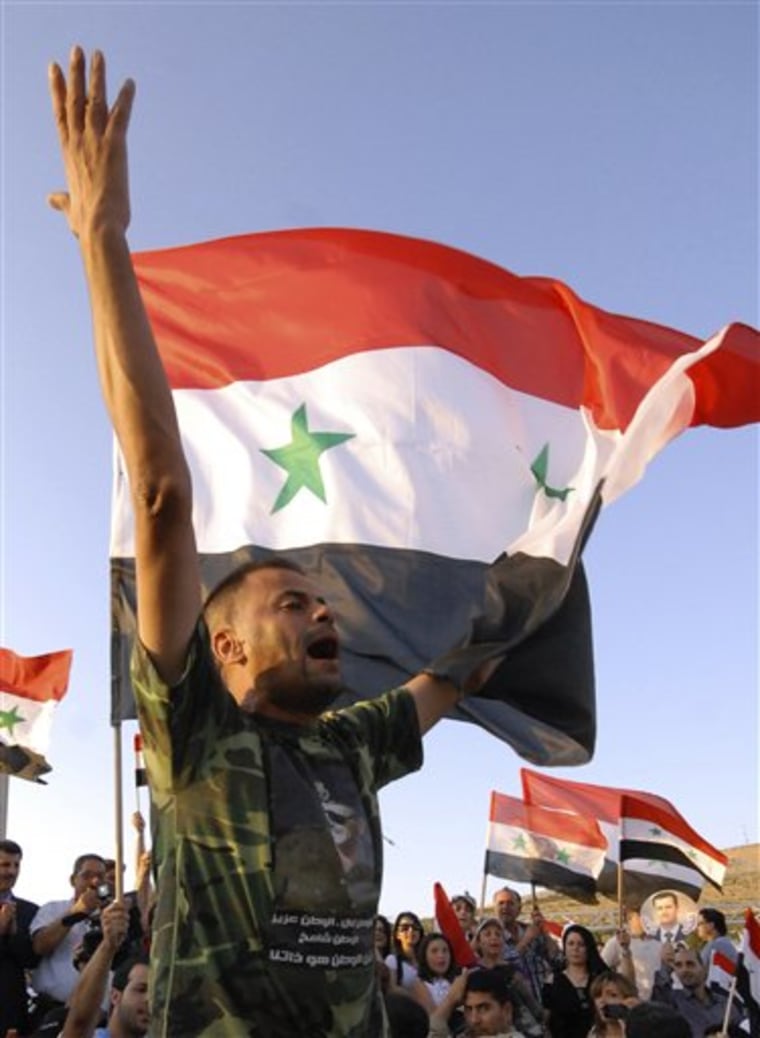Tens of thousands of Syrians carrying olive branches and shouting for the downfall of President Bashar Assad's regime streamed Friday into the flashpoint city of Hama, where the U.S. and French ambassadors traveled in a strong show of support for the protest movement.
Mass demonstrations also erupted in cities and towns nationwide, triggering a crackdown that killed at least five people, activists said. But Hama's demonstration was by far the largest and most closely watched.
Ammar Qurabi, Cairo-based head of the Syrian National Human Rights Organization, said three people were killed in the town of Maarat al-Numaan on the eastern edge of Idlib province, and another was killed in the central Damascus district of Midan.
"There is also heavy shooting on protesters in the city of Homs and in the Damascus suburb of Saqba," Qurabi told Reuters. He said security forces killed three Harasta residents in overnight assault on suburb.
Two witnesses said crowds were swelling in Hama, which has become a focal point of the uprising and has drawn the largest crowds since the revolt began nearly four months ago.
"People are chanting, 'We only kneel to God,' one of the witnesses told the AP by telephone, as the sound of the crowd was heard in the background. He asked for anonymity, fearing for his personal safety.
Get real-time updates on this story from breakingnews.com
Hama poses a potential dilemma for the Syrian regime because of its place as a symbol of opposition to the rule of the Assad family. In 1982, the late Hafez Assad ordered troops to crush a rebellion by Islamist forces, killing between 10,000 and 25,000 people, rights activists say.
A major offensive could make the city a fresh rallying cry for the opposition, but Assad's regime also does not want a repeat of last Friday's stunning rally, when an estimated 300,000 people protested.
The U.S. and French ambassadors traveled to Hama on Thursday and left on Friday before the protests began, according to officials in Washington and Paris.
Visit condemned
U.S. Ambassador Robert Ford's visit drew strong condemnation from the Syrian government, which said the visit was unauthorized and a clear sign that Washington was inciting unrest in the Arab nation. Relations between the U.S. and Syria are chronically strained over Assad's close ties with Iran.
"The presence of the U.S. ambassador in Hama without obtaining prior permission from the Foreign Ministry as stipulated by instructions distributed repeatedly to all the embassies is clear evidence of the U.S. involvement in the ongoing events in Syria," the state-run news agency reported Friday, citing an unnamed "official source" at the Foreign Ministry.
The U.S. is trying to "aggravate the situations which destabilize Syria," the statement said.
Ford reached the city after passing checkpoints run by the military and Hama residents and also visited a hospital treating the wounded.
Edgar Vasquez, a State Department spokesman, told msnbc.com that Ford "was greeted warmly by average Syrian people," and said "many" had "put flowers in his car."
"I think he saw a city that had changed as a result of actions by the Syrian security forces, the violence and repression they have taken against the Syrian people," Vasquez said.
"It was only a month ago that Hama had stores and shops that were open, people walking around. It was more of a normal town," he added. "I think now you can see there's a difference. You don't see the same vibrancy that you would expect from a town that hasn't been subjected to the kind of violence and repression that Hama has."
Vasquez said Ford had not witnessed any violence himself while in Hama.
The Syrian government did not comment on French Ambassador Eric Chevallier's trip to Hama.
'Violence and arbitrary arrests'
France's Foreign Ministry said in a statement that Chevallier's visit shows "France's concern for the Syrian population ... (France) denounces the pursuit of violence and arbitrary arrests and the absence of a credible commitment from the Syrian authorities to a political reform process."
Hama residents have shut down the city in recent days, going on strike and trying to prevent security forces from entering by setting up checkpoints of tires and concrete blocks.

Still, the London-based Syrian Observatory for Human Rights said 21 people have been killed there since Tuesday. Another group, the National Organization for Human Rights in Syria said, as many as 22 people were shot dead and more than 80 wounded.
The Syrian regime has used a mix of fierce violence and promises of imminent reform to try to quell the uprising, which was inspired by the revolutions in Tunisia and Egypt. Some 1,600 people and 350 members of security forces have been killed since demonstrations began, activists say.
The regime blames "armed thugs" and foreign conspirators for the unrest, not true reform-seekers.
Also Friday, security forces killed three protesters in Maaret al-Numan, a town on the highway linking Damascus, the capital, with Syria's largest city, Aleppo, said Syrian rights activist Ammar Qurabi.
Two other people were killed in Damascus' central neighborhood of Midan and in the nearby town of Dumari, activists said.
Overnight, Syrian forces killed three people in a demonstration in the Damascus suburb of Harasta, activists said. Many protesters have recently been opting for nighttime demonstrations and candlelight vigils, aiming for a time when the security presence thins out.
Three activists confirmed the Damascus death toll to The Associated Press.
A Syria-based activist said residents told him that security forces used live bullets and smoke bombs to quell the demonstration. He spoke on condition of anonymity, fearing for his own safety.
Syria has banned nearly all foreign media and restricted media coverage, making it nearly impossible to independently verify events on the ground.
